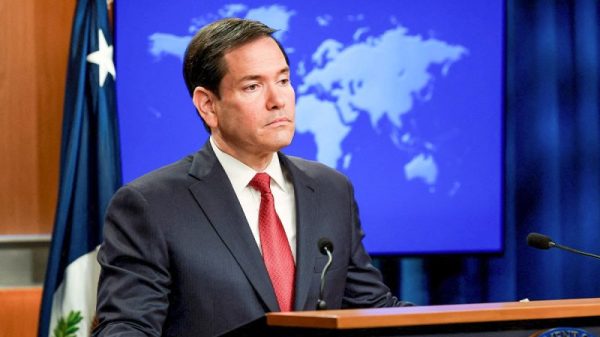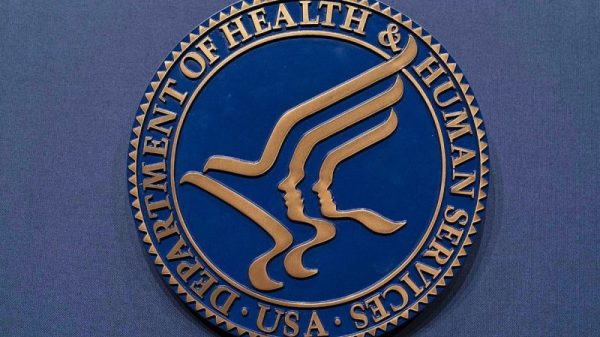For months, President Biden’s campaign aides have dismissed concerns about his sagging approval ratings by asserting that once the 2024 race becomes a clear binary choice between the president and his Republican rival, voters would decidedly reject Donald Trump and back Biden.
Biden’s team is now mounting a full-scale drive to highlight Trump’s flaws and present a sharp contrast between the two. But that effort is coming under strain as large groups of voters reject the prospect of choosing between two broadly unpopular options. Millions have already experimented with leaving their ballots blank, legions more are expressing interest in third-party candidates and some anti-Trump Republicans are talking about forming a new party.
Many more are telling pollsters they may simply stay home in November.
The phenomenon threatens to undermine Biden’s bid for a second term, even while it also poses challenges for Trump. The race could hinge on whether Biden can get voters turned off by the former president to see him as the only palatable alternative, said Molly Murphy, a Democratic pollster who has been conducting polls and focus groups to examine such voters.
“Their feelings toward Trump are far more intensely negative than their negative feelings of skepticism about the president,” said Murphy, who was recently tapped to serve as a pollster for Biden’s campaign. “But we have to convince them that if they don’t vote for the president, they are effectively voting for Trump.”
The Trump campaign faces its own version of this danger. Many Republicans voted against Trump in the Republican primaries. His campaign must persuade them that the only other option is a reelecting a president they deride as an elderly, weak leftist.
In the past few days, both Biden and Trump have ramped up their attacks on the other as an existential threat to the nation. Asked to name the foremost threat to freedom and democracy in America, Biden did not hesitate to say it was Trump.
“Donald Trump uses phrases like, ‘We’re going to eviscerate the Constitution,’” Biden said in an interview that aired on Univision Tuesday. “He’s going to be a dictator on Day One.”
Trump, for his part, suggests that Biden is letting violent crime and illegal immigration unravel the country. “This country is finished if we don’t win this election,” he said last week at a rally in Green Bay, Wis.
America is unusual among democracies in giving voters two choices each election; many countries have multiple parties that can win a share of power. But as Americans’ rage and disaffection with the U.S. political system grows, voters are recoiling from those choices and putting a strain on the binary system.
Polls now show that as many as 20 percent of voters are considering third-party candidates and many others are otherwise dissatisfied with the choice of Biden and Trump and looking for another option.
For Biden, who won 7 million more votes than Trump in 202o, the greatest threat is not that his supporters will defect to Trump, according to pollsters and strategists on both sides. Instead, if even a sliver of the electorate declines to see the race as binary, Biden’s electoral chances could be thwarted by people who don’t cast a ballot for him or Trump.
Third-party options are especially alarming to Democratic operatives, many of whom believe the last two Republican presidents made it to the Oval Office only because liberal voters in critical states did not view the 2000 and 2016 elections through the two-party lens, opting instead for Green Party candidates — Ralph Nader and Jill Stein — who they felt better represented their views.
This year, Democrats have launched a fierce campaign to discredit the leading third-party candidates, including Robert F. Kennedy Jr., Stein and scholar Cornel West. The recent failure of the centrist group No Labels to find its own nominee came after a withering assault from Biden supporters.
Biden’s campaign officials say the picture will change once voters start paying more attention to the race.
“A defining characteristic of these voters right now is that they haven’t yet tuned in to the election,” said Meg Schwenzfeier, chief analytics officer for the Biden campaign. “A lot of what we have to do, as they tune in, is make the case on all fronts of what’s at stake in the election.”
Schwenzfeier added that many swing voters are still not convinced that Trump — who faces 91 criminal charges — will be the Republican nominee. Biden allies have been working to elevate Trump’s most extreme comments in recent weeks, stressing his comments on restricting abortion, conducting mass deportations and targeting political opponents.
And when Biden faces questions about his own vulnerabilities — including his age, the war in Gaza and immigration — he often responds by saying essentially that Trump would be worse.
“You’ve got to take a look at the other guy,” Biden, 81, told comedian Seth Myers in February when asked about his age. “He’s about as old as I am, but he can’t even remember his wife’s name.” Trump is 77.
Biden has also slammed Trump over his foreign policy in response to criticism over his handling of the war in Gaza. Asked in January if he was concerned about losing Arab American support, Biden said, “The former president wants to put a ban on Arabs coming into the country. We’ll make sure we understand who cares about the Arab population.”
Trump and his allies have also seized on the binary framing, seeking to persuade skeptical Republicans that a second Biden term is unacceptable. GOP lawmakers who previously denounced Trump over the Jan. 6, 2021, insurrection and other issues — including Senate Minority Leader Mitch McConnell (R-Ky.) — have explained their decision to back him by highlighting their disdain for Biden.
But not all disaffected Republicans are prepared to grit their teeth and vote for Trump. Peter Wehner, a senior fellow at the Trinity Forum, a Christian think tank, who has worked in three Republican administrations, recently suggested that conservative Republicans could create a new party.
“Trump is a threat to the country and the Constitution in ways Joe Biden is not,” Wehner said in an interview. “And Trump is breaking the Republican Party in ways that Biden could never do.”
Bryan Lanza, a Republican strategist who advised Trump’s 2016 campaign, predicted that many voters unhappy with Biden will stay home in a repeat of the dynamic that doomed Hillary Clinton’s presidential bid in 2016. “This is a reflection of the Biden coalition that may not be fully ready to vote for Trump, but they’re looking for other options,” he said.
Biden aides strongly disagree and are ramping up their efforts to reach so-called “double haters” who dislike Biden and Trump. Internal campaign data show that this group is disproportionately made up of young voters, people of color and those disengaged from politics, aides said.
The aides highlighted the campaign’s $25 million rush of ad spending last year and a $30 million blitz this spring. Last year’s ads focused largely on Biden’s record, but the most recent spots lean heavily on a stark contrast with Trump.
One ad, released by the Biden campaign Monday, features an emotional testimonial from a woman who it says developed sepsis and nearly died after she was denied medical help for a miscarriage, due to Texas’s restrictions on abortion. “Donald Trump did this,” the ad says.
Another ad, titled “Only One Choice” and running in Spanish media, describes the electoral options in simple terms: Biden or Trump.
The Biden team says the strategy is already working, citing recent polls that have found Biden gaining ground on Trump or even pulling ahead, though other surveys show a largely unchanged neck-and-neck race.
But the negativity on both sides risks turning off voters who are already disenchanted with the Biden-Trump rematch, analysts said. “The atmosphere is way beyond mudslinging,” said Douglas Brinkley, a presidential historian who described the 2024 race as “toxic” and prone to “voter disengagement from the whole malignant carnival of low-road political dysfunction.”
At Bethune-Cookman University, a historically Black school in Daytona Beach, Fla., many students are voicing dismay about “the fact that they are confronting the same choice again” in the 2024 election, said Kideste Yusef, who teaches criminal justice and advises a political action group on campus.
Her students — the kind of young, minority and politically active voters Biden’s campaign is banking on — have often felt as if the two major candidates are not speaking to the issues they care about, she said.
“I don’t see anyone energetically saying, ‘I’m going to vote for Trump,’ but it’s definitely not automatically like, Oh my God, did you hear what he said? We are definitely going to vote for Biden,’” she said. “Instead, it’s kind of like, ‘Yeah, neither one of them are doing anything to benefit me.’”
The war in Gaza has only served to calcify the feelings of dismay, said Yusef, who is Muslim and has struggled with the same sense of angst as some of her students. “Even though I know what a Trump presidency will look like, it’s still very hard to want to make that choice” to vote for Biden, she said.
Protests over Biden’s handling of the war in Gaza represent perhaps the starkest example of voters rejecting the premise of a binary 2024 race. In states like Michigan and Minnesota, which have large Arab American populations, voters have waged ambitious, organized efforts to withhold votes from Biden in recent Democratic primaries, with tens of thousands of people instead selecting “uncommitted.”
The Biden campaign expects many of those voters to support the president in the fall, but some Democrats worry that they will simply stay home.
The dire conditions in Gaza, where more than 33,000 people have been killed and thousands more are on the brink of famine, have become a vexing liability for Biden’s campaign. Israel launched its military campaign in Gaza after Hamas militants killed some 1,200 Israelis, including many civilians, and took more than 250 people hostage on Oct. 7.
Biden has recently ramped up pressure on Israeli Prime Minister Benjamin Netanyahu to prevent civilian casualties and allow more aid into Gaza, but many activists have suggested he will need to do much more to win back their votes.
Eva Borgwardt, who worked as a field organizer for Biden’s 2020 campaign in Arizona, said the binary framing Biden has embraced does not account for the deep anger among voters who feel he should be doing more to rein in the Israeli government.
“As someone who worked in 2020 to get the vote out for Biden, I know how critical motivation is to winning the general election,” said Borgwardt, a spokeswoman for the Jewish group IfNotNow, which opposes Israel’s campaign in Gaza. “I’m terrified of Trump, and that’s why I’m furious at Biden for playing with the risk that voters will feel unheard — given his continued support of Netanyahu’s assault on Palestinians in Gaza — and stay home.”
Leigh Ann Caldwell contributed to this report.
For months, President Biden’s campaign aides have dismissed concerns about his sagging approval ratings by asserting that once the 2024 race becomes a clear binary choice between the president and his Republican rival, voters would decidedly reject Donald Trump and back Biden.
Biden’s team is now mounting a full-scale drive to highlight Trump’s flaws and present a sharp contrast between the two. But that effort is coming under strain as large groups of voters reject the prospect of choosing between two broadly unpopular options. Millions have already experimented with leaving their ballots blank, legions more are expressing interest in third-party candidates and some anti-Trump Republicans are talking about forming a new party.
Many more are telling pollsters they may simply stay home in November.
The phenomenon threatens to undermine Biden’s bid for a second term, even while it also poses challenges for Trump. The race could hinge on whether Biden can get voters turned off by the former president to see him as the only palatable alternative, said Molly Murphy, a Democratic pollster who has been conducting polls and focus groups to examine such voters.
“Their feelings toward Trump are far more intensely negative than their negative feelings of skepticism about the president,” said Murphy, who was recently tapped to serve as a pollster for Biden’s campaign. “But we have to convince them that if they don’t vote for the president, they are effectively voting for Trump.”
The Trump campaign faces its own version of this danger. Many Republicans voted against Trump in the Republican primaries. His campaign must persuade them that the only other option is a reelecting a president they deride as an elderly, weak leftist.
In the past few days, both Biden and Trump have ramped up their attacks on the other as an existential threat to the nation. Asked to name the foremost threat to freedom and democracy in America, Biden did not hesitate to say it was Trump.
“Donald Trump uses phrases like, ‘We’re going to eviscerate the Constitution,’” Biden said in an interview that aired on Univision Tuesday. “He’s going to be a dictator on Day One.”
Trump, for his part, suggests that Biden is letting violent crime and illegal immigration unravel the country. “This country is finished if we don’t win this election,” he said last week at a rally in Green Bay, Wis.
America is unusual among democracies in giving voters two choices each election; many countries have multiple parties that can win a share of power. But as Americans’ rage and disaffection with the U.S. political system grows, voters are recoiling from those choices and putting a strain on the binary system.
Polls now show that as many as 20 percent of voters are considering third-party candidates and many others are otherwise dissatisfied with the choice of Biden and Trump and looking for another option.
For Biden, who won 7 million more votes than Trump in 202o, the greatest threat is not that his supporters will defect to Trump, according to pollsters and strategists on both sides. Instead, if even a sliver of the electorate declines to see the race as binary, Biden’s electoral chances could be thwarted by people who don’t cast a ballot for him or Trump.
Third-party options are especially alarming to Democratic operatives, many of whom believe the last two Republican presidents made it to the Oval Office only because liberal voters in critical states did not view the 2000 and 2016 elections through the two-party lens, opting instead for Green Party candidates — Ralph Nader and Jill Stein — who they felt better represented their views.
This year, Democrats have launched a fierce campaign to discredit the leading third-party candidates, including Robert F. Kennedy Jr., Stein and scholar Cornel West. The recent failure of the centrist group No Labels to find its own nominee came after a withering assault from Biden supporters.
Biden’s campaign officials say the picture will change once voters start paying more attention to the race.
“A defining characteristic of these voters right now is that they haven’t yet tuned in to the election,” said Meg Schwenzfeier, chief analytics officer for the Biden campaign. “A lot of what we have to do, as they tune in, is make the case on all fronts of what’s at stake in the election.”
Schwenzfeier added that many swing voters are still not convinced that Trump — who faces 91 criminal charges — will be the Republican nominee. Biden allies have been working to elevate Trump’s most extreme comments in recent weeks, stressing his comments on restricting abortion, conducting mass deportations and targeting political opponents.
And when Biden faces questions about his own vulnerabilities — including his age, the war in Gaza and immigration — he often responds by saying essentially that Trump would be worse.
“You’ve got to take a look at the other guy,” Biden, 81, told comedian Seth Myers in February when asked about his age. “He’s about as old as I am, but he can’t even remember his wife’s name.” Trump is 77.
Biden has also slammed Trump over his foreign policy in response to criticism over his handling of the war in Gaza. Asked in January if he was concerned about losing Arab American support, Biden said, “The former president wants to put a ban on Arabs coming into the country. We’ll make sure we understand who cares about the Arab population.”
Trump and his allies have also seized on the binary framing, seeking to persuade skeptical Republicans that a second Biden term is unacceptable. GOP lawmakers who previously denounced Trump over the Jan. 6, 2021, insurrection and other issues — including Senate Minority Leader Mitch McConnell (R-Ky.) — have explained their decision to back him by highlighting their disdain for Biden.
But not all disaffected Republicans are prepared to grit their teeth and vote for Trump. Peter Wehner, a senior fellow at the Trinity Forum, a Christian think tank, who has worked in three Republican administrations, recently suggested that conservative Republicans could create a new party.
“Trump is a threat to the country and the Constitution in ways Joe Biden is not,” Wehner said in an interview. “And Trump is breaking the Republican Party in ways that Biden could never do.”
Bryan Lanza, a Republican strategist who advised Trump’s 2016 campaign, predicted that many voters unhappy with Biden will stay home in a repeat of the dynamic that doomed Hillary Clinton’s presidential bid in 2016. “This is a reflection of the Biden coalition that may not be fully ready to vote for Trump, but they’re looking for other options,” he said.
Biden aides strongly disagree and are ramping up their efforts to reach so-called “double haters” who dislike Biden and Trump. Internal campaign data show that this group is disproportionately made up of young voters, people of color and those disengaged from politics, aides said.
The aides highlighted the campaign’s $25 million rush of ad spending last year and a $30 million blitz this spring. Last year’s ads focused largely on Biden’s record, but the most recent spots lean heavily on a stark contrast with Trump.
One ad, released by the Biden campaign Monday, features an emotional testimonial from a woman who it says developed sepsis and nearly died after she was denied medical help for a miscarriage, due to Texas’s restrictions on abortion. “Donald Trump did this,” the ad says.
Another ad, titled “Only One Choice” and running in Spanish media, describes the electoral options in simple terms: Biden or Trump.
The Biden team says the strategy is already working, citing recent polls that have found Biden gaining ground on Trump or even pulling ahead, though other surveys show a largely unchanged neck-and-neck race.
But the negativity on both sides risks turning off voters who are already disenchanted with the Biden-Trump rematch, analysts said. “The atmosphere is way beyond mudslinging,” said Douglas Brinkley, a presidential historian who described the 2024 race as “toxic” and prone to “voter disengagement from the whole malignant carnival of low-road political dysfunction.”
At Bethune-Cookman University, a historically Black school in Daytona Beach, Fla., many students are voicing dismay about “the fact that they are confronting the same choice again” in the 2024 election, said Kideste Yusef, who teaches criminal justice and advises a political action group on campus.
Her students — the kind of young, minority and politically active voters Biden’s campaign is banking on — have often felt as if the two major candidates are not speaking to the issues they care about, she said.
“I don’t see anyone energetically saying, ‘I’m going to vote for Trump,’ but it’s definitely not automatically like, Oh my God, did you hear what he said? We are definitely going to vote for Biden,’” she said. “Instead, it’s kind of like, ‘Yeah, neither one of them are doing anything to benefit me.’”
The war in Gaza has only served to calcify the feelings of dismay, said Yusef, who is Muslim and has struggled with the same sense of angst as some of her students. “Even though I know what a Trump presidency will look like, it’s still very hard to want to make that choice” to vote for Biden, she said.
Protests over Biden’s handling of the war in Gaza represent perhaps the starkest example of voters rejecting the premise of a binary 2024 race. In states like Michigan and Minnesota, which have large Arab American populations, voters have waged ambitious, organized efforts to withhold votes from Biden in recent Democratic primaries, with tens of thousands of people instead selecting “uncommitted.”
The Biden campaign expects many of those voters to support the president in the fall, but some Democrats worry that they will simply stay home.
The dire conditions in Gaza, where more than 33,000 people have been killed and thousands more are on the brink of famine, have become a vexing liability for Biden’s campaign. Israel launched its military campaign in Gaza after Hamas militants killed some 1,200 Israelis, including many civilians, and took more than 250 people hostage on Oct. 7.
Biden has recently ramped up pressure on Israeli Prime Minister Benjamin Netanyahu to prevent civilian casualties and allow more aid into Gaza, but many activists have suggested he will need to do much more to win back their votes.
Eva Borgwardt, who worked as a field organizer for Biden’s 2020 campaign in Arizona, said the binary framing Biden has embraced does not account for the deep anger among voters who feel he should be doing more to rein in the Israeli government.
“As someone who worked in 2020 to get the vote out for Biden, I know how critical motivation is to winning the general election,” said Borgwardt, a spokeswoman for the Jewish group IfNotNow, which opposes Israel’s campaign in Gaza. “I’m terrified of Trump, and that’s why I’m furious at Biden for playing with the risk that voters will feel unheard — given his continued support of Netanyahu’s assault on Palestinians in Gaza — and stay home.”
Leigh Ann Caldwell contributed to this report.





















